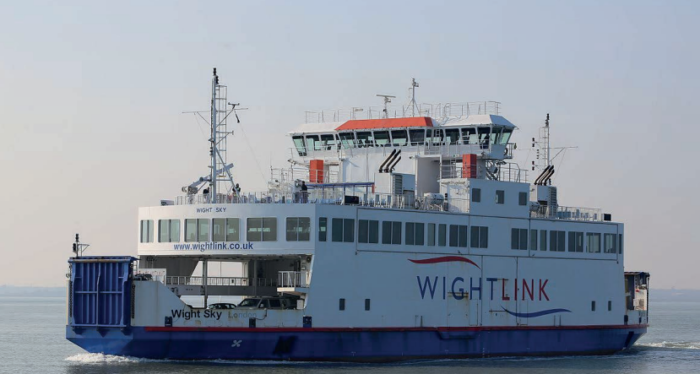On 12 September 2017, while approaching Yarmouth, Isle of Wight, the ro-ro passenger ferry Wight Sky suffered a catastrophic failure of one of its main propulsion engines, and fire broke out. The fire was control immediately, but the vessel’s engineer suffered serious burn injuries. He was subsequently diagnosed with post-traumatic stress disorder and had not returned to work until now, UK MAIB informs.
The incident
On 12 September 2017, the ro-ro passenger ferry Wight Sky left Lymington for the 40-minute passage to Yarmouth. There were 40 persons on board. During the afternoon shift, the vessel’s engineer tested the engine on load, and on departure from Lymington all four main engines were sharing the sea load.
Later, the engineer went down to the forward engine room from the machinery monitoring room (MMR), located on the main vehicle deck, to note the machinery running parameters for the logbook. He saw that the high temperature cooling water header tank for ME2 required topping up and, while he was filling the tank with coolant, he heard an unusually loud sound from the engine. The mechanic was attending to main propulsion engine 1 (ME1) located in the same space. As the engineer rushed towards ME2’s emergency shutdown button, there was a loud explosion from its crankcase.
The engineer, who was wearing a full sleeved cotton boiler suit, was momentarily engulfed in a ball of fire and experienced intense pain. He exited the engine room and, assisted by the mechanic, went to the MMR. They called the bridge and informed the master of the situation. The master abandoned berthing, and released the Hi-fog fire suppression system for the forward engine room.
[smlsubform prepend=”GET THE SAFETY4SEA IN YOUR INBOX!” showname=false emailtxt=”” emailholder=”Enter your email address” showsubmit=true submittxt=”Submit” jsthanks=false thankyou=”Thank you for subscribing to our mailing list”]
On the master’s order, the bosun informed the passengers of the incident and reassured them that the situation was under control. The master then called the emergency services and asked for ambulance and fire services. Wight Sky berthed and all passengers and vehicles disembarked.
After berthing, an ambulance arrived on board Wight Sky and took the engineer to the hospital. The fire brigade arrived at approximately 22.00. When firefighters entered the engine room, the Hi-fog system had stopped. On inspecting the engine room, the firefighters discovered a small fire burning inside ME2’s crankcase. They extinguished this with a portable dry powder extinguisher.
The engineer suffered burns to his hands and face. Although he was discharged from hospital after 7 days, he was diagnosed with post-traumatic stress disorder. He had not returned to work at the time of publishing this report.
Probable cause
After conducting an investigation, UK MAIB concluded to the following as causes of this accident:
- Debris in the engine’s oil channels was most probably responsible for initiating the failure;
- When the shells of main bearing 5 turned, the lubrication supply to big end bearing 4 was blocked, resulting in destructive failure;
- The engine was not fitted with a wear detector, so there was no means of receiving a warning before the engine failed;
- The essential services switchboard aft circuit breaker had been left in manual mode, resulting in the loss of power to critical equipment, including the fixed fire-fighting system;
- Rebuilding the engine and transporting it in parts to the engine room through an emergency escape rather than using the vessel’s deck opening, created the possibility of dirt ingress into the engine bearing lubricating channel.
Recommendations
UK MAIB recommended Volvo Penta UK (2018/120), to consider offering wear particle detection technology for marine engines that cannot be easily serviced on board.
For more details into the accident, see the PDF herebelow





























































